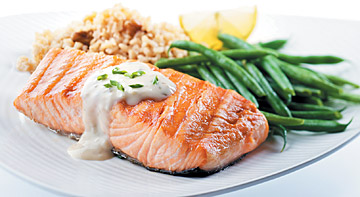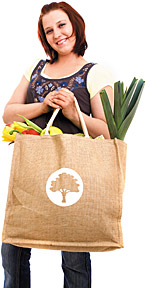The Brain and The Belly
If food were merely fuel, we'd probably all be at our optimal weight. We'd belly up to the table, eat 'till we were full, and then hop up and move on to the next activity.
But food is often more than fuel. It's comfort, enjoyment, fellowship, etc. It's about how we show love, celebrate, and console ourselves and others. And more often than not, we're eating it on the run or at a gulp so we can move on to bath time or the next activity.
So, the battle for balance has two fronts: the belly and the brain. They need to work together to keep your food intake balanced and your body healthy. You need your brain to learn what your body needs every day - maybe by keeping a food journal, paying attention to how you feel after each meal, or by watching the scale. And you need your belly to tell you when you're satisfied and what foods do the trick.
 Using both our belly and brain, we can come up with a menu of foods we find tasty and satisfying in the amounts we need to maintain a healthy weight. And don't forget - our bodies are changing every day! From childhood to our golden years, our nutritional needs change as our body changes. Infant brain development, growth spurts, sports and activities, puberty, reproduction, menopause, and the aging body all require unique nutrition for optimal growth and health.
Using both our belly and brain, we can come up with a menu of foods we find tasty and satisfying in the amounts we need to maintain a healthy weight. And don't forget - our bodies are changing every day! From childhood to our golden years, our nutritional needs change as our body changes. Infant brain development, growth spurts, sports and activities, puberty, reproduction, menopause, and the aging body all require unique nutrition for optimal growth and health.
Use Balanced Eating as a Tool for Lifelong Health
By thinking about what you eat, how much of it you need, and whether or not your food is nutrient dense, you can start to control one major factor of chronic disease. And that's one powerful risk factor in your favor. According to research, premature deaths that are attributable to personal choices (like smoking, diet, exercise, alcohol/drugs, etc.) have increased by 40 percent in the past 100 years; so while it's estimated that 5 percent of deaths in 1900 were due to personal choices, by 2000 that number increased to 45 percent. This suggests that our health is to a large extent under our control.
So let's take control of what we can, and have fun doing it. Take a cooking class, resolve to try one new fruit, grain, or bean a week, or just make one healthy food addition/substitution a week - like eating green salad before a slice of pizza. Simple changes now can turn into long-term habits that help safeguard our quality of life for the future.
 5 Ways to Ensure Balanced, Healthy Eating
5 Ways to Ensure Balanced, Healthy Eating
- Pay attention to what you eat. It may be boring, but writing down what you eat is the best way to actually see what your daily diet looks like. And you may be surprised by what it shows. Once it's there in black and white, you can see what you're doing right and what you might want to change.
- Make sure every grain you eat is a whole grain. Grain products like bagels can ramp up your calories without providing much bang for the buck. Be adventurous! Try a new grain like quinoa, or replace the white flour in a muffin recipe with whole wheat or even a mix of oat, whole wheat and bran.
- Eat a fruit and vegetable with every meal. Yes, even breakfast. And no, most jelly doesn't count. Cold cucumbers with an egg sandwich or a reheated spinach omelet can help you meet your daily need for the vital nutrition found in fruits and vegetables.
- Look at labels. If any one of the "daily values" for fat, protein, or carbohydrates is off the charts, put that item back.
- Buy fresh and local as much as possible. Stay on the perimeter of the grocery store where the fresh food lives. And if your grocery store doesn't stock local growers, talk to the produce manager and ask your friends to make comments, too. You could also join a community supported agriculture co-op, or make a point to visit your local farmers market.
Sara Tiner, BA, BS, MS, is the coordinator of scientific communication for a whole-food supplement manufacturer in Wisconsin. With undergraduate degrees in biology and English from Ripon College, and a master's degree in journalism from Columbia University, she's worked as a science writer in both print and radio over the past decade, and moonlights as a freelance contributor to various publications.

